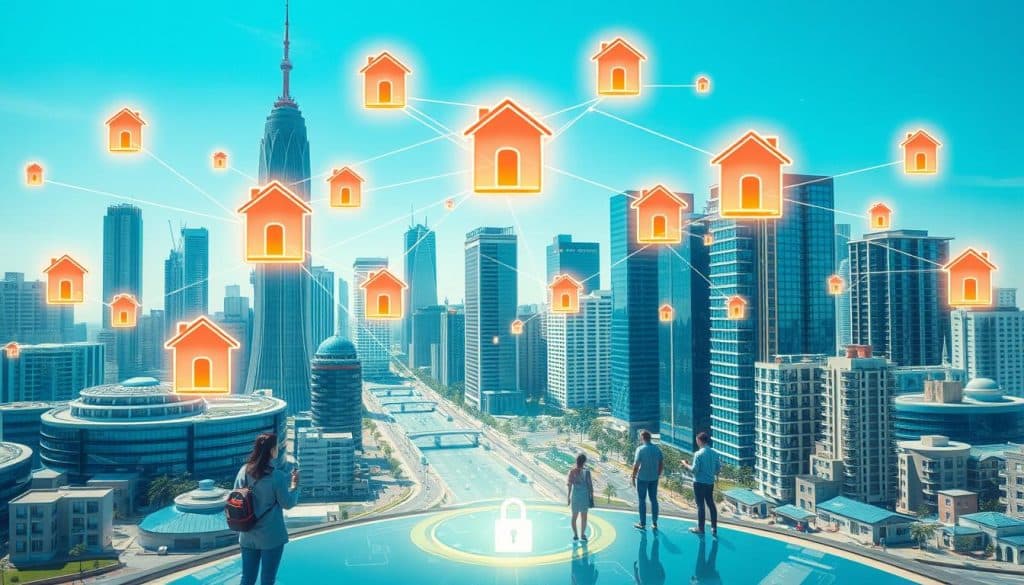Hedge funds and institutional investors own 82.15% of Visa’s stock1. This shows the rising popularity of digital assets in finance. Real estate is experiencing a similar revolution through tokenisation and blockchain technology.
The real estate market has long struggled with fraud and unclear transactions. Tokenisation offers a game-changing solution to these problems. It brings unmatched transparency and security to property deals.
Tokenisation uses blockchain to create digital versions of physical properties. This turns them into tradable digital assets. It’s changing how we buy, sell, and invest in real estate.
Global adoption of tokenisation is growing fast. It’s creating new opportunities for investors and property owners. The real estate market is becoming more accessible and trustworthy.
Enhanced security measures are now in place. Processes have been streamlined for efficiency. These changes are making the market more appealing to all.
Key Takeaways
- Tokenisation leverages blockchain for secure property transactions
- Digital assets in real estate combat fraud effectively
- Blockchain technology enhances transparency in property deals
- Tokenisation simplifies complex real estate transactions
- Digital representation of properties increases market accessibility
The Growing Concern of Real Estate Fraud
Real estate fraud is a rising issue affecting individuals and the economy. It takes various forms, with far-reaching consequences. Learn about the types of property fraud and their impacts.
Common Types of Real Estate Fraud
Property fraud comes in many forms. Title fraud involves falsifying documents to transfer ownership illegally. Mortgage fraud occurs when false information is provided to secure loans.
Identity theft in real estate can lead to severe financial losses. Criminals use stolen identities to conduct fraudulent property transactions.
Economic Impact of Fraudulent Activities
Real estate fraud causes billions in losses annually. It affects individuals, businesses, and financial institutions. In North America, broker commissions can be 5-6% of a property’s sale price2.
Vulnerabilities in Traditional Real Estate Transactions
Traditional real estate deals have many weak points. Complex paperwork and multiple intermediaries create fraud opportunities. Document manipulation is also a risk in these transactions.
Cross-border deals face extra challenges. These include currency exchange issues, legal differences, and multi-jurisdiction compliance2. These vulnerabilities highlight the need for more secure systems.
“The complexity of real estate transactions creates a breeding ground for fraud. We need innovative solutions to protect buyers, sellers, and investors.”
New technologies like blockchain are emerging as potential solutions. These innovations aim to fight fraud and boost transaction security in real estate.
Understanding Tokenisation in Real Estate
Tokenisation revolutionizes property ownership through blockchain technology. It creates digital tokens representing physical assets. This allows for fractional ownership and increased liquidity in the property market.
Digital tokens are virtual representations of real-world properties. They divide a property into smaller, tradable units. Investors can now buy and sell shares easily, making real estate investment more accessible.
Blockchain technology is key to tokenisation. It provides a secure, transparent ledger for recording property ownership. This system builds trust and reduces fraud in real estate deals.
Tokenisation benefits go beyond individual investors. It streamlines property transactions and reduces paperwork. Real estate firms can use this tech to improve operations and client interactions3.
“Tokenisation is revolutionizing how we think about property ownership. It’s not just about buying a house anymore; it’s about investing in a piece of the real estate market.”
Here’s a breakdown of how tokenisation impacts different aspects of real estate:
| Aspect | Traditional Method | Tokenised Approach |
|---|---|---|
| Ownership | Whole property | Fractional shares |
| Liquidity | Low | High |
| Transaction Speed | Slow | Fast |
| Market Access | Limited | Widespread |
The real estate industry is embracing digital innovation. Tokenisation leads this revolution. It makes property ownership more accessible, transparent, and efficient for everyone involved.
How Blockchain Technology Supports Tokenisation
Blockchain technology transforms real estate deals through tokenisation. It uses digital ledgers to boost security and transparency. This innovative approach makes property transactions more efficient.
Immutable Record-Keeping
Blockchain’s core strength is its unchangeable ledger. It creates a permanent record of all transactions. This system protects property ownership data and reduces fraud risks.
Smart Contracts and Automated Processes
Smart contracts streamline real estate deals. They automate processes and reduce the need for middlemen. These self-executing agreements make transactions faster and more secure.
Decentralized Verification Systems
Blockchain offers robust verification for property deals. Its distributed approach builds trust among involved parties. This technology enables secure, direct transactions between buyers and sellers.
Blockchain in real estate tokenisation shows great promise. Rexas Finance, a real-world asset tokenization project, raised $3.5 million quickly. This success highlights strong investor interest in blockchain technology4.
The trend points to blockchain’s potential in changing property deals. It’s reshaping how we think about ownership structures in real estate5.
Benefits of Tokenisation for Fraud Prevention
Tokenisation offers a powerful solution to combat real estate fraud. It uses blockchain technology to provide enhanced security and transparent transactions. Sensitive property data remains safe from unauthorized access through cryptographic protection.
Real estate tokenisation creates a clear, auditable trail of ownership and transfers. This transparency reduces fraudulent activities in property deals. Every transaction is recorded on an immutable ledger, making record manipulation nearly impossible.
Tokenisation’s impact on the real estate market is substantial. PropiChain, a leading platform, could control about $3 trillion worth of real estate assets. This represents 1% of the global real estate market, valued at $300 trillion6.
Tokenisation enhances security and streamlines processes. Smart contracts automate many aspects of real estate transactions. This reduces human error and the need for intermediaries, minimizing points of vulnerability.
Investors also benefit from tokenisation. Analysts predict an 801.41% profit potential for PropiChain’s token presale investors. The discounted entry price starts at $0.0046. This shows growing confidence in tokenisation for secure real estate investment.
As the real estate industry adopts tokenisation, fraudulent activities are likely to decrease. Enhanced security, transparent transactions, and automated processes create a robust system. This protects all parties involved in property transactions.
Tokenisation: Enhancing Transparency in Property Transactions
Tokenisation is changing real estate for the better. It boosts transparency and security in property deals. This new method improves ownership tracking and cuts down on middlemen.
Real-Time Tracking of Ownership
Tokenisation gives you quick access to property ownership info. You get up-to-date records without delays. PropiChain leads the way with RWA tokenization for fractional real estate ownership7.
Verifiable Transaction History
Every property deal is recorded and can’t be changed. This helps stop fraud and makes checks easier. PropiChain’s token presale lets you join this clear system7.
Analysts think portfolios could grow up to 800% with this new approach7.
Reduced Intermediaries and Information Asymmetry
Tokenisation makes property deals faster by reducing middlemen. This leads to quicker sales and lower costs. PropiChain sets aside 20% of its tokens for smooth transactions7.
| Feature | Benefit |
|---|---|
| Real-Time Ownership Tracking | Instant updates on property ownership |
| Verifiable Transaction History | Enhanced fraud prevention and easier due diligence |
| Reduced Intermediaries | Faster, more cost-effective transactions |
Tokenisation in real estate uses advanced tech like AI. PropiChain uses AI for smart insights and auto valuation models7.
This fits the trend of AI in finance. JPMorgan Chase uses AI to check billions of daily transactions for fraud8.
Implementing Digital Assets in Real Estate

The real estate industry is experiencing a digital revolution through blockchain technology. Asset digitization is changing how property ownership is handled. Digital property tokens are gaining popularity, offering new real estate investment methods.
Blockchain in real estate creates tokens representing property ownership. This process needs tech experts, legal professionals, and real estate specialists. The global real estate market is ready for innovation.
The commodities market is projected to reach $121.2 trillion by 20259. This shows the enormous potential for growth in the sector.
Successful projects have proven digital assets’ viability in real estate. Rexas Finance (RXS) doubled its price from $0.03 to $0.06 in under a month9. This growth shows increasing interest in real-world asset tokenization.
| Aspect | Traditional Real Estate | Tokenized Real Estate |
|---|---|---|
| Liquidity | Low | High |
| Fractional Ownership | Limited | Easily Accessible |
| Transaction Speed | Slow | Fast |
| Transparency | Variable | High |
Digital assets in real estate offer many benefits. These include increased liquidity, fractional ownership, and enhanced transparency. The industry is evolving rapidly.
Regulators like FINRA are examining these technologies’ impact on securities. They provide guidance on privacy and data protection in virtual environments3.
Digital property tokens are revolutionizing the real estate market, democratizing access to investments traditionally reserved for the elite.
Blockchain adoption in real estate is growing. Investors and professionals must stay informed about new developments. The future of property investment is becoming increasingly digital.
This shift offers exciting opportunities for those ready to embrace change. Staying ahead of the curve can lead to significant advantages.
Smart Contracts: Automating and Securing Real Estate Deals
Smart contracts are changing real estate transactions. They streamline complex processes and boost efficiency. These automated agreements also reduce errors in property deals.
Self-Executing Agreements
Smart contracts automatically fulfill predefined conditions. This automation improves transaction efficiency and reduces the need for middlemen. Blade Labs in Qatar uses smart contracts for Murabaha agreements10.
Their platform enables fractional ownership. It attracts diverse customers through tokenization.
Reducing Human Error and Manipulation
Smart contracts minimize human error in property transactions. By automating processes, they lower the risk of mistakes. This leads to more secure and reliable deals.
Streamlining Complex Transactions
Smart contracts excel at handling complex real estate deals. They manage multiple steps, conditions, and parties involved. This cuts down paperwork and speeds up processes.
PropiChain’s platform uses AI for advanced insights. It also employs automated valuation models to enhance efficiency7.
Smart contracts in real estate are gaining popularity. Recently, 24 investment events occurred in the crypto market. Infrastructure and DeFi sectors led this trend11.
The real estate industry is embracing smart contracts. We can expect more transparent and secure property deals. The future of real estate is automated and reshaping the market rapidly.
Overcoming Challenges in Adopting Tokenisation
Tokenisation in real estate faces several hurdles. Regulatory uncertainties are a big challenge. Lawmakers are figuring out how to fit this new tech into existing rules.
Technological adoption requires major investment in infrastructure and training. Market education is crucial. Many people don’t know about tokenisation or its benefits yet.
Understanding the ethical implications of these technologies is key for success. The potential for tokenisation is clear in various sectors.
In 2020, the global carbon offset market traded over 1.1 billion tons of CO2 equivalent. This shows the scale of markets that could benefit from better transparency12.
The crypto space has grown fast. Liquid memecoins increased from 92 in 2021 to over 1,000 by March 2025. This shows rapid adoption in certain areas13.
To tackle these issues, teamwork is vital. Industry experts, policymakers, and tech gurus must join forces. They need to create clear rules and invest in user-friendly platforms.
Educational programs are also important. By addressing these challenges, tokenisation can become a powerful tool. It can fight real estate fraud and boost transparency in property deals.
























 Bitcoin
Bitcoin  Ethereum
Ethereum  Tether
Tether  XRP
XRP  USDC
USDC  Solana
Solana  JUSD
JUSD  TRON
TRON  Lido Staked Ether
Lido Staked Ether  Dogecoin
Dogecoin  Figure Heloc
Figure Heloc  Cardano
Cardano  Wrapped stETH
Wrapped stETH  WhiteBIT Coin
WhiteBIT Coin  Bitcoin Cash
Bitcoin Cash  Wrapped Bitcoin
Wrapped Bitcoin  USDS
USDS  Wrapped eETH
Wrapped eETH  Binance Bridged USDT (BNB Smart Chain)
Binance Bridged USDT (BNB Smart Chain)  LEO Token
LEO Token  Monero
Monero  Chainlink
Chainlink  Hyperliquid
Hyperliquid  Coinbase Wrapped BTC
Coinbase Wrapped BTC  Ethena USDe
Ethena USDe  Canton
Canton  Stellar
Stellar  WETH
WETH  Zcash
Zcash  USD1
USD1  Litecoin
Litecoin  Sui
Sui  Avalanche
Avalanche  USDT0
USDT0  Dai
Dai  sUSDS
sUSDS  Hedera
Hedera  Shiba Inu
Shiba Inu  World Liberty Financial
World Liberty Financial  Ethena Staked USDe
Ethena Staked USDe  PayPal USD
PayPal USD  Toncoin
Toncoin  Cronos
Cronos  Rain
Rain  Polkadot
Polkadot  Uniswap
Uniswap  Tether Gold
Tether Gold  Mantle
Mantle